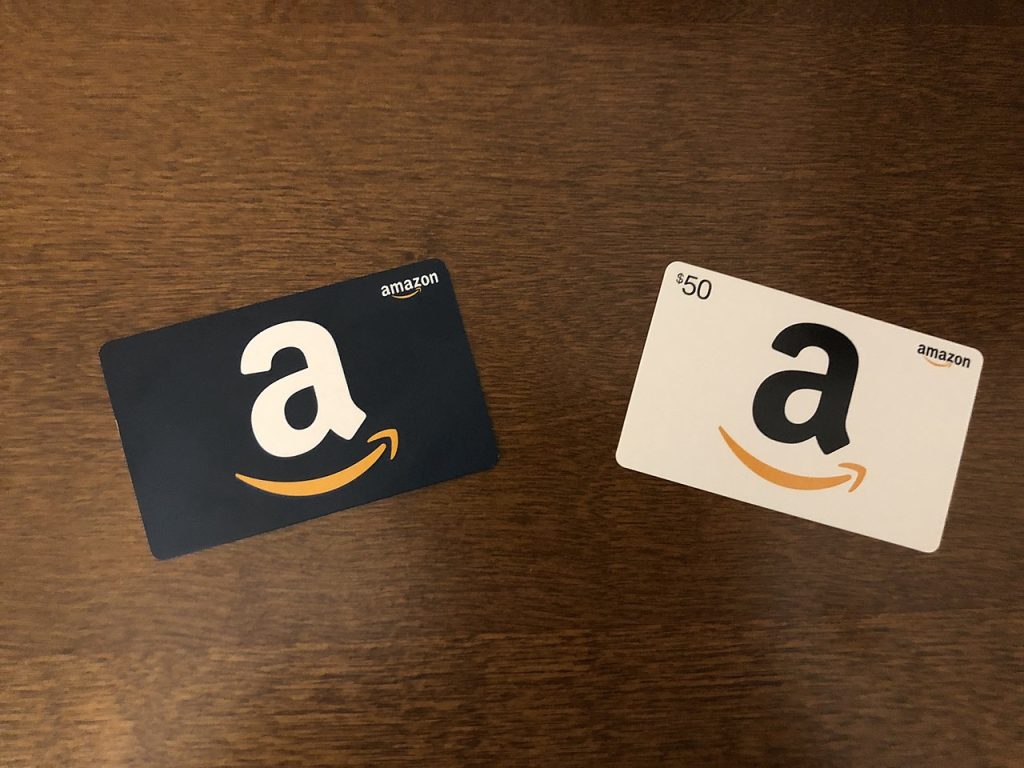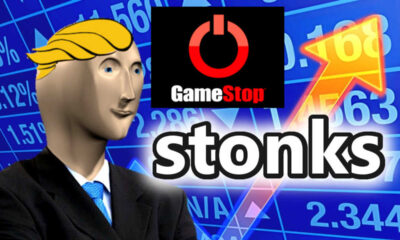Business
Smart Investors Could Capture Billions in Unclaimed Value in 2024. Here’s How [CardCash.com | RSTN]
A recent report published by AP News has revealed a massive black hole in the economy, costing consumers tens of billions of dollars a year. CardCash.com, recently acquired by RDE, Inc., is addressing the problem, giving consumers a way to reclaim lost value, and investors a way to capture the profit. Here we take a close look at the opportunity for investors looking for outsized returns in 2024.

The day after Christmas, Associated Press (AP) News published a report that investors in 2024 can’t afford to ignore:
The Secret Life of Gift Cards: Here’s What Happens to the Billions That Go Unspent Each Year
As for what makes this report one that investors can’t afford to ignore, that’s simple — it boils down to 1) A couple of lines from the AP report, and; 2) Another news drop from this week.
Let’s start with #1 — the bits from the AP report:
- Every year, “many [gift] cards — tens of billions of dollars’ worth — wind up forgotten or otherwise unused”
- One increasingly popular “option is to sell it [the unwanted gift card] on a site like CardCash”
And now for #2 — the news that dropped this week:
RDE, Inc. [OTC: RSTN] Closes CardCash.com Acquisition in Creating $100 Million+ Incentives Business
Finally, to finish off this little introduction (and give you all the puzzle pieces we’ll soon put together), let’s pull a few lines from the RDE, Inc. [OTC: RSTN] CardCash.com acquisition announcement:
- “Founded in 2014, CardCash.com has accelerated its business traction in generating $101.7 million in revenue in 2022.”
- “The increase in consumer demand and growth reflects the value in CardCash.com’s unique model of purchasing unwanted gift cards at a reduced rate and offering them to budget-conscious shoppers at attractive discounts.”
- The “U.S. consumer gift card market [is currently] valued at $300 billion annually.”
- “According to ReportLinker, the U.S. gift card market is expected to reach $467 billion by 2025”
Here’s Why This Creates a Massive Opportunity for Investors in 2024
Let’s put some of these pieces together to spell out the exact opportunity all the above creates.
- Unwanted gift cards are a massive, multi-billion-dollar opportunity that’s showing no sign of slowing down. (According to AP, we’re talking tens of billions here.)
- CardCash.com gives people holding unwanted gift cards an easy way to get something everyone wants instead (cold hard cash).
- The CardCash.com business has been accelerating significantly.
- However, it was a privately held company.
- RDE, Inc. [OTC: RSTN] is a publicly traded company. (And its other flagship brand, Restaurant.com, is a cracker, too — but we’ll come back to that later when we look at the acquisition deal in more detail.)
- As a public company, RDE’s acquisition of CardCash.com means investors can now profit from the booming gift card opportunity. (And by booming, I mean it — remember, the total gift card market in the US is forecast to grow from $300 billion to $467 billion by 2025.)
Now, of course, just because there are signs of an opportunity, that doesn’t mean you should leap in head first. After all, if the acquisition is to pay off as the raw opportunity suggests it will, there are a few questions that we need to ask.

Here’s what we’ll cover next:
- Does RDE’s financial position suggest it can a) Continue as a going concern, and; b) Continue to invest in growing both CardCash.com and its existing Restaurant.com brand?
- Does the acquisition fundamentally make sense? I.e., does the combination of Restaurant.com and CardCash.com create opportunities for enhanced operational efficiencies, cross-selling, etc.?
- All things considered, does RDE’s stock [OTC: RSTN] represent good value?
Let’s work through these questions in order.
Does RDE’s Financial Position Allow it to Continue Investing in Growing CardCash.com and Restaurant.com?
While both CardCash.com and Restaurant.com have already established significant footholds in their respective markets, both are still, fundamentally growth-stage businesses. That means, if RDE is to continue investing in growing these businesses and realize their full potential, it’s going to need to sustain negative cash flows for a number of years to come.
Now, the phrase “sustain negative cash flows for a number of years” might sound off-putting at first. But let’s clear a couple of things up first.
- When it comes to online businesses, investing every available dollar in growth is what turns “decent” businesses into titans — Amazon.com, Inc. [NASDAQ: AMZN], for example, ran at a loss for a looonnngg time and had people asking ‘will it ever make money?’ for literal decades (E.g., this NASDAQ article from 2013).
- Whether such activity is sustainable or not basically boils down to the health of a company’s balance sheet, its burn rate, and its ability to raise capital when needed.
So with that cleared up, let’s check in on RDE’s most recent financials (period ending September 30, 2023).
- Between 2022 and 2023, RDE expanded its balance sheet from $1.57 million to $3.17 million in total assets, of which $2.61 million was held in cash and cash equivalents, plus another $157k in accounts receivable as of September 30.
- Between 2022 and 2023, RDE reduced its losses from operations from $567k in 2022 to just $190k in 2023 for the period ending September 30.
- To date, RDE hasn’t had any trouble raising additional capital at favorable rates via equity financing. As for whether any possible future equity financing represents a dilution risk, we’ll get to that when we answer our last question (whether RDE’s stock represents good value).
As for the immediate hit to RDE’s balance sheet from the cash component of the CardCash.com acquisition, that will be precisely $1 million due at closing (there’s an additional promissory note of the same value due in a couple of years, but that’s not an immediate concern).
Now, to do some quick back-of-the-envelope math, that will leave RDE with around $1.77 million in cash. Assuming no additional capital raises, that gives RDE a little over 2 years based on its current cash holdings (assuming it can maintain its most recent net burn rate of $190k — but we actually suspect this burn rate will reduce following the CardCash.com acquisition. More on this soon).
In other words, RDE is in a strong position to continue growing its businesses over the medium term.
As for the long-term, things are also looking good here. Either it manages to become cashflow positive over the coming years (possible), or it raises (which it has already demonstrated it can do on demand, and on favorable terms).
Does the CardCash.com Acquisition Make Sense?
Here, I’m not going to spend too long analyzing how much sense the CardCash.com acquisition makes. Spoiler alert — I’ve been following this deal since word first leaked out about the impending deal, and you can read a full analysis of the CardCash.com acquisition here.
Now, of course, I don’t expect everyone to read that article, so let’s summarize a few points here.
Let’s start with the boring stuff (we’ll get to the good stuff soon), starting with the implications for RDE’s burn rate.
- The core technology build-out for both CardCash.com and Restaurant.com is reasonably mature at this point.
- CardCash.com was already fully functional prior to acquisition, including its B2B-facing elements.
- Restaurant.com completed the final piece of its technology puzzle when it launched the Restaurant.com mobile app in October 2023.
- This means two things.
- First, we should expect Restaurant.com to significantly cut its capex on its tech buildout in the coming months. This should help bring RDE’s burn rate from its Restaurant.com activities right down.
- Second — and this is the first major win from the acquisition — with the tech focus for both CardCash.com and Restaurant.com now more heavily geared towards everyday operations and maintenance, we should expect RDE, Inc. to heavily consolidate teams from both businesses and realize significant savings.
- RDE, Inc. should also realize similar savings through consolidating executive and other operational functions across both companies. Given the similar nature of both businesses, operational savings in particular should be significant.
- When the dust settles, our estimates suggest that RDE, Inc. should be able to come out the other end with a similar burn rate to what it had pre-CardCash.com.
So far, so good. However, we’ve really only answered whether RDE can continue to invest in growing CardCash.com and Restaurant.com over the medium and long term.
Now let’s get to the good stuff — the bits that could see this deal take off like a rocket.
- The synergies and cross-promotional opportunities between Restaurant.com and CardCash.com are absolutely huge.
- Both are operating in the discounted voucher/gift card/certificate space (Restaurant.com sells discounted restaurant experiences).
- This means consumers on each platform will have an exceptionally high affinity for the other platform.
- As such, simply cross-promoting each platform to users of the other platform is highly likely to generate significant incremental revenue for both platforms.
- There are dozens of opportunities to integrate both platforms to create new revenue streams. For example, using each platform’s existing technology, it’s entirely possible a Restaurant.com integration with CardCash.com could allow consumers to pay for restaurant meals with, quite literally, any gift card (E.g., a user might exchange an Amazon or Apple [NASDAQ: AAPL] gift card for a discounted meal deal at a local restaurant).
Now there are of course a few other pieces to the “how much sense does this acquisition make?” puzzle.
But, to cut a long story short, the answer is a resounding yes. If you want to dig deeper into how big of a resounding yes that is, go take a look at the article we published when the RDE, Inc. acquisition of CardCash.com was first announced.
Onwards and upwards.

Is RDE, Inc. [OTC: RSTN] Stock Good Value?
As to whether RDE, Inc. [OTC: RSTN] stock is good value or not, this is another one of those cases where I’m going to point you elsewhere for the full analysis. In particular, this article here, where we covered the implications of the recent Vivid Seats Inc. [NASDAQ: SEAT] acquisition of Vegas.com.
Now, again, I don’t actually expect you to go and read that article (you should, but there are no expectations from me). So, here are the top-level highlights:
- In a recent deal, Vivid Seats Inc. [NASDAQ: SEAT] acquired a substantially similar business (Vegas.com — a discounted Vegas experiences platform) to RDE, Inc. [OTC: RSTN] at a 5x revenue multiple.
- Shifts in consumer spending intentions are creating major tailwinds for discount-focused platforms like Vegas.com, Restaurant.com, and CardCash.com.
- This suggests the Vegas.com acquisition, far from being an anomaly, is quite representative of how we should be valuing these platforms going forward.
- With that said, we do need to adjust the revenue multiple to account for the tighter margins CardCash.com and Restaurant.com operate on compared to Vegas.com. Here, a fair valuation is a 2.5x multiple on RDE’s combined revenues from CardCash.com and Restaurant.com.
- Combined revenues from both platforms will put RDE, Inc. [OTC: RSTN] well north of the $100 million mark in annual revenue.
- That suggests a fair valuation for RDE of $250 million.
- RDE’s current market cap is hovering just shy of $40 million.
- That leaves RDE significantly undervalued, even if we account for the possibility of some mild dilution from, let’s say, a $1-2 million equity raise in the next year or two.
Let’s Round This All Up
Alright, that was a lot to take in. Let’s put all of this together in one place.
- A recent AP report revealed tens of billions annually worth of unwanted gift cards.
- The report also highlighted the growing popularity of CardCash.com for consumers looking to realize some value from their unwanted gift cards.
- RDE, Inc. [OTC: RSTN] just completed its acquisition of CardCash.com, giving investors an opportunity to ride on the back of this gift card opportunity.
- RDE is in a fundamentally solid position to continue growing both CardCash.com and its existing Restaurant.com business over the medium and long term.
- The acquisition makes a ton of sense, allowing RDE to realize massive synergies between the two businesses.
- Given shifting consumer spending intentions, RDE is currently massively undervalued, even if we account for some minor dilution owing to the high probability of an equity financing round in the next year or two.
In short, RDE, Inc. [OTC: RSTN] investors are perfectly poised to do exactly what the title of this article says — to capture billions in unclaimed [gift card] value. And a whole lot more.
__
(Featured image by Giorgio Trovato via Unsplash)
DISCLAIMER: This article was written by a third party contributor and does not reflect the opinion of Born2Invest, its management, staff or its associates. Please review our disclaimer for more information.
This article may include forward-looking statements. These forward-looking statements generally are identified by the words “believe,” “project,” “estimate,” “become,” “plan,” “will,” and similar expressions. These forward-looking statements involve known and unknown risks as well as uncertainties, including those discussed in the following cautionary statements and elsewhere in this article and on this site. Although the Company may believe that its expectations are based on reasonable assumptions, the actual results that the Company may achieve may differ materially from any forward-looking statements, which reflect the opinions of the management of the Company only as of the date hereof. Additionally, please make sure to read these important disclosures.

-

 Fintech5 days ago
Fintech5 days agoMuzinich and Nao Partner to Open Private Credit Fund to Retail Investors
-

 Crowdfunding2 weeks ago
Crowdfunding2 weeks agoSwitzerland’s Crowdfunding Market Remains Stable – Without Growth
-

 Crypto8 hours ago
Crypto8 hours agoBitcoin Traders on DEXs Brace for Downturn Despite Price Rally
-

 Business1 week ago
Business1 week agoDebt-Fueled Markets, Zombie Corporations, and the Coming Reckoning




![RDE, Inc. [NASDAQ: RSTN] hits the Nasdaq](https://born2invest.com/wp-content/uploads/2024/08/rde-inc-hits-the-nasdaq-400x240.jpg)
![RDE, Inc. [NASDAQ: RSTN] hits the Nasdaq](https://born2invest.com/wp-content/uploads/2024/08/rde-inc-hits-the-nasdaq-80x80.jpg)




![Kevin Harrington - 1.5 Minutes to a Lifetime of Wealth [OTC: RSTN]](https://born2invest.com/wp-content/uploads/2023/12/kevin-harrington-400x240.jpg)
![Kevin Harrington - 1.5 Minutes to a Lifetime of Wealth [OTC: RSTN]](https://born2invest.com/wp-content/uploads/2023/12/kevin-harrington-80x80.jpg)












